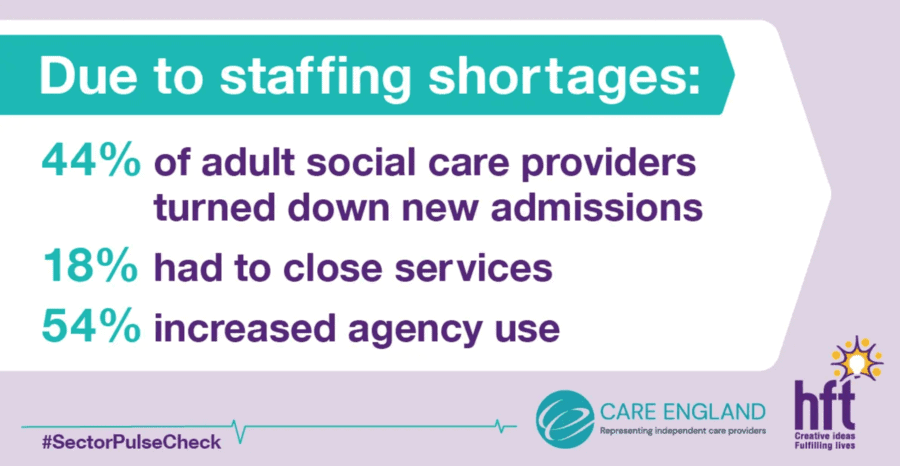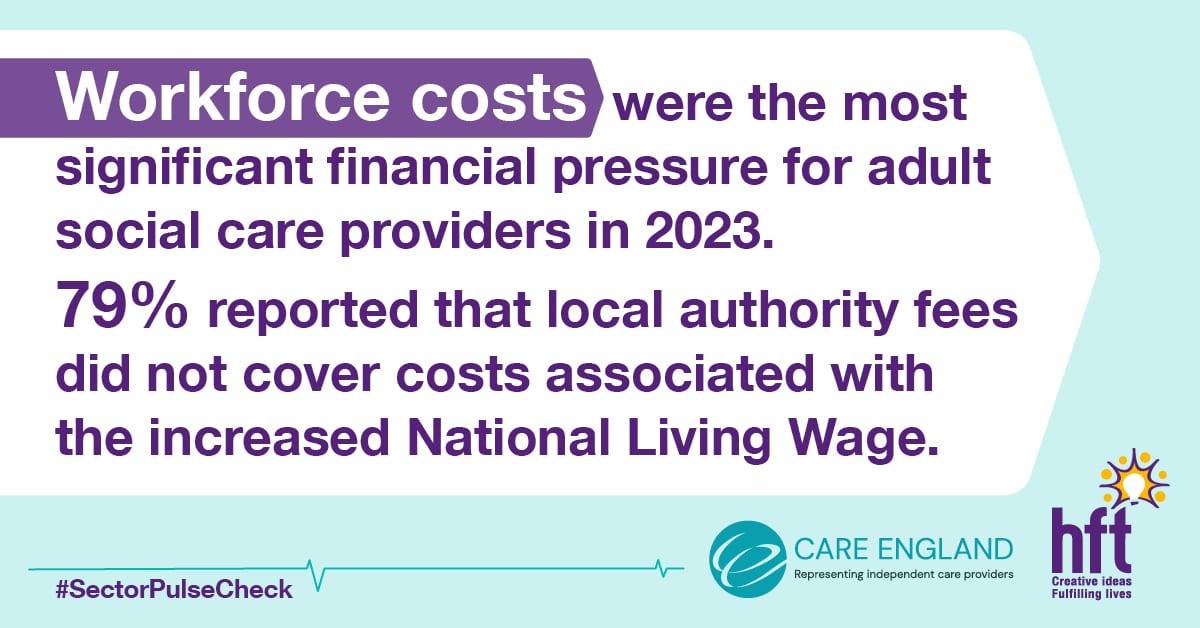HfT and Care England report reveals social care system in crisis despite funding boost

Independent research commissioned by learning disability charity Hft and Care England, the largest representative body for independent providers of adult social care in England, revealed that Government grants are not reaching the people who need them most.
The 2023 Sector Pulse Check report, based on a large-scale survey of adult social care providers, finds that despite a £7.5bn funding boost in the 2022 Autumn Statement, there has been little progress in the key challenges facing the sector.
In fact, the situation is arguably more perilous than ever. The report revealed energy cost increases of up to 350 per cent and unfunded rises in the National Living Wage left 40 per cent of adult social care providers in deficit in 2023.
This is particularly concerning when 84 per cent of care providers said that recent funding initiatives from Government – such as the Market Sustainability and Improvement Fund and International Recruitment Fund – made no difference to the financial sustainability of their organisation over the past year.
The inevitable result has been a reduced capacity to deliver care across providers, as 43 per cent closed and 39 per cent considered exiting the market altogether.
These financial challenges are compounded by a deep-rooted and systematic crisis in the workforce. Despite a rise in international recruitment, staffing shortages remain widespread. Nearly half (44%) of organisations had to turn down admissions due to a lack of staff.
The findings are a clear indication that the current approach to adult social care funding simply isn’t working. The recent tightening of immigration rules for overseas care staff and a growing concern about the dire state of local government finances only serve to add to the distress surrounding the future of the adult social care sector.
Hft and Care England call on the government to implement immediate measures to support the care sector – including improving commissioning practice, revising VAT arrangements and removing barriers to ethical international recruitment.
Steve Veevers, Chief Executive of Hft, commented: “It is difficult to offer words of hope and motivation when the past 12 months have seen the adult social care sector engulfed in a sustained state of crisis.
“Despite moving away from the immediate challenges posed by the COVID-19 pandemic, there has been little respite from the fundamental financial and workforce pressures that have faced our sector for many years. The fact that 43 per cent of providers told us they closed a part of their organisation or handed back contracts last year is testament to this.
“It is extremely disappointing that the over-arching recommendations from last year’s Sector Pulse Check report haven’t been actioned and, despite additional investment from Government, we continue to operate amid significant challenges.
“The upcoming General Election provides the new Government with a perfect opportunity to address what is a key challenge for today’s society but one which nobody seems to be taking seriously enough.
“Our report provides several realistic, practical and impactful suggestions – including reforming VAT, revisiting the new visa laws for international workers and establishment of national commissioning standards – which we shouldn’t delay in implementing if we want to see real change from the next Government.”
Professor Martin Green OBE, Chief Executive of Care England, says: “The narrative that social care is under pressure is not a new one. What’s disappointing is that we find ourselves in a worsening crisis amid the Government’s narrative of ‘record investment’ into the sector.
“While the Government did make substantial commitments in the 2022 Autumn Budget, the outcomes have not matched the ambition. The new money into the sector has not led to tangible change or any significant progress towards ‘fixing adult social care’.
“It’s clear that the way our system is funded needs a rethink. For years, adult social care providers have absorbed increased costs and inflationary pressures without corresponding funding. When money is made available it simply isn’t cutting through.
“Recent changes to immigration rules and an insufficient Local Government Finance Settlement this year further suggest a Government that is heading in the wrong direction. The sector’s needs are now on red alert.
“Our long-term vision remains one of a sustainable sector that is financially viable and an attractive destination for staff. While this may seem a distant reality, there are a range of policies at the Government’s disposal that would help turn the tide and put us on the path towards a sustainable future.
“As we count down to a general election, the Government must now make good on their promise to fix our sector. The recommendations outlined in this report represent pragmatic first steps and I urge the Government to lose no time in implementing them.”
Dr Rhidian Hughes, Chief Executive of the Voluntary Organisations Disability Group (VODG) says the report paints a bleak picture of the impact years-long under-funding but with the Spring Budget ahead it is not too late for this government to act.

Sarah White, Head of Policy at the national disability charity Sense, said that the report reveals “potentially catastrophic consequences” for the people who rely on the social care sector.
She said: “Sense is calling for urgent investment to plug this gap alongside a long-term sustainable financial plan for the social care sector. How much more evidence that the system is broken will it take before the Government commits to serious action?”


